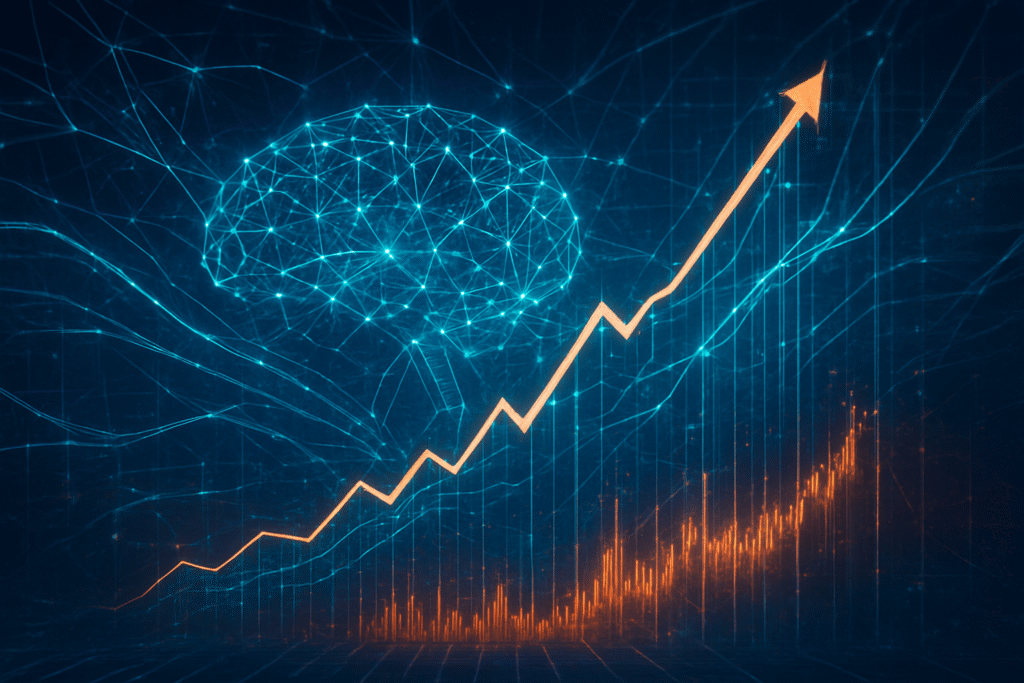
In a candid and revealing interview, Alphabet (NASDAQ: GOOGL) CEO Sundar Pichai has issued a stark warning regarding the sustainability of the artificial intelligence (AI) market's explosive growth. His statements, made on Tuesday, November 18, 2025, underscored growing concerns about the soaring wave of investment in AI, suggesting that certain aspects exhibit "elements of irrationality" reminiscent of past tech bubbles. While affirming AI's profound transformative potential, Pichai's caution from the helm of one of the world's leading technology companies has sent ripples through the industry, prompting a critical re-evaluation of market valuations and long-term economic implications.
Pichai's core message conveyed a nuanced blend of optimism and apprehension. He acknowledged that the boom in AI investments represents an "extraordinary moment" for technology, yet drew direct parallels to the dot-com bubble of the late 1990s. He warned that while the internet ultimately proved profoundly impactful despite excessive investment, similar "irrational exuberance" in AI could lead to a significant market correction. Crucially, he asserted that "no company is going to be immune," including Alphabet, if such an AI bubble were to burst. This immediate significance of his remarks lies in their potential to temper the unbridled investment frenzy and foster a more cautious, scrutinizing approach to AI ventures.
The Technical and Economic Undercurrents of Caution
Pichai's cautionary stance is rooted in a complex interplay of technical and economic realities that underpin the current AI boom. The development and deployment of advanced AI models, such as Google's own Gemini, demand an unprecedented scale of resources, leading to immense costs and significant energy consumption.
The high costs of AI development are primarily driven by the need for specialized and expensive hardware, particularly Graphics Processing Units (GPUs) and Tensor Processing Units (TPUs). Only a handful of major tech companies possess the financial might to invest in the vast computational resources, data centers, and associated electricity, cooling, and maintenance. Alphabet's R&D spending, heavily skewed towards AI and cloud infrastructure, saw a substantial increase in 2023, with capital expenditures projected to reach $50 billion in 2025. This includes a single quarter where over $13 billion was directed towards building data centers and operating AI systems, marking a 92% year-over-year jump. Competitors like OpenAI have committed even more, with an estimated $1.4 trillion planned for cloud and data center infrastructure over several years. Beyond initial development, AI models require continuous innovation, vast datasets for training, and frequent retraining, further escalating costs.
Compounding the financial burden are the immense energy demands of AI. The computational intensity translates into rapidly increasing electricity consumption, posing both environmental and economic challenges. AI's global energy requirements accounted for 1.5% of global electricity consumption last year, with projections indicating that the global computing footprint for AI could reach 200 gigawatts by 2030, equivalent to Brazil's annual electricity consumption. Alphabet's greenhouse gas emissions have risen significantly, largely attributed to the high energy demands of AI, prompting Pichai to acknowledge that these surging needs will delay the company's climate goals. A single AI-powered Google search can consume ten times more energy than a traditional search, underscoring the scale of this issue.
Despite these massive investments, effectively monetizing cutting-edge AI technologies remains a significant hurdle. The integration of AI-powered answers into search engines, for example, can reduce traditional advertising impressions, compelling companies like Google to devise new revenue streams. Google is actively exploring monetization through AI subscriptions and enterprise cloud services, leveraging Gemini 3's integration into Workspace and Vertex AI to target high-margin enterprise revenue. However, market competition and the emergence of lower-cost AI models from competitors create pressure for industry price wars, potentially impacting profit margins. There's also a tangible risk that AI-based services could disrupt Google's foundational search business, with some analysts predicting a decline in traditional Google searches due to AI adoption.
Shifting Sands: Impact on Companies and the Competitive Landscape
Sundar Pichai's cautionary statements are poised to reshape the competitive landscape, influencing investment strategies and market positioning across the AI industry, from established tech giants to nascent startups. His warning of "irrationality" and the potential for a bubble burst signals a more discerning era for AI investments.
For AI companies in general, Pichai's remarks introduce a more conservative investment climate. There will be increased pressure to demonstrate tangible returns on investment (ROI) and sustainable business models, moving beyond speculative valuations. This could lead to a "flight to quality," favoring companies with proven products, clear use cases, and robust underlying technology. A market correction could significantly disrupt funding flows, particularly for early-stage AI firms heavily dependent on venture capital, potentially leading to struggles in securing further investment or even outright failures for companies with high burn rates and unclear paths to profitability.
Tech giants like Alphabet (NASDAQ: GOOGL), Microsoft (NASDAQ: MSFT), and Amazon (NASDAQ: AMZN) are not immune, despite their vast resources. Pichai's assertion that even Alphabet would be affected underscores the systemic risk. Competition in core AI infrastructure, such as specialized chips (like Nvidia's (NASDAQ: NVDA) offerings and Google's superchips) and massive data centers, will intensify. Giants with "full-stack" control over their technology pipeline, from chips and data to models and research, may be perceived as better prepared for market instability. However, their high capital expenditures in AI infrastructure represent both a commitment to leadership and a significant risk if the market sours. These companies are emphasizing their long-term vision, responsible AI development, and the integration of AI across their vast product ecosystems, positioning themselves as stable innovators.
Startups are arguably the most vulnerable to Pichai's cautionary tone. The bar for securing funding will likely rise, demanding more compelling evidence of product-market fit, sustainable revenue models, and operational efficiency. "Hype-driven" startups may find it much harder to compete for investment against those with more robust business plans. Decreased investor confidence could lead to a significant slowdown in funding rounds, mass layoffs, and even failures for companies unable to pivot or demonstrate financial viability. This could also lead to consolidation, with larger tech giants acquiring promising startups at potentially lower valuations. Startups that are capital-efficient, have a distinct technological edge, and a clear path to profitability will be better positioned, while those with undifferentiated offerings or unsustainable expenditure face significant disadvantages.
The Wider Significance: Beyond the Balance Sheet
Sundar Pichai's warning about AI market sustainability resonates far beyond financial implications, touching upon critical ethical, environmental, and societal concerns that shape the broader AI landscape. His comparison to the dot-com bubble serves as a potent reminder that even transformative technologies can experience periods of speculative excess.
The parallels to the dot-com era are striking: both periods saw immense investor excitement and speculative investment leading to inflated valuations, often disconnected from underlying fundamentals. Today, a significant concentration of market value resides in a handful of AI-focused tech giants, echoing how a few major companies dominated the Nasdaq during the dot-com boom. While some studies indicate that current funding patterns in AI echo a bubble-like environment, a key distinction lies in the underlying fundamentals: many leading AI companies today, unlike numerous dot-com startups, have established revenue streams and generate substantial profits. The demand for AI compute and power is also described as "insatiable," indicating a foundational shift with tangible utility rather than purely speculative potential.
However, the impacts extend well beyond market corrections. The environmental impact of AI is a growing concern. The massive computational demands for training and operating complex AI models require enormous amounts of electricity, primarily for powering servers and data centers. These data centers are projected to double their global electricity consumption by 2030, potentially accounting for nearly 3% of total global electricity use and generating substantial carbon emissions, especially when powered by non-renewable sources. Alphabet's acknowledgment that AI's energy demands may delay its net-zero climate targets highlights this critical trade-off.
Ethical implications are also at the forefront. AI systems can perpetuate and amplify biases present in their training data, leading to discriminatory outcomes. The reliance on large datasets raises concerns about data privacy, security breaches, and potential misuse of sensitive information. The "black box" nature of some advanced AI models hinders transparency and accountability, while AI's ability to generate convincing but false representations poses risks of misinformation and "deepfakes." Pichai's caution against "blindly trusting" AI tools directly addresses these issues.
Societally, AI's long-term impacts could be transformative. Automation driven by AI could lead to significant job displacement, particularly in labor-intensive sectors, potentially exacerbating wealth inequality. Excessive reliance on AI for problem-solving may lead to "cognitive offloading," diminishing human critical thinking skills. As AI systems become more autonomous, concerns about the potential loss of human control arise, especially in critical applications. The benefits of AI are also likely to be unequally distributed, potentially widening the gap between wealthier nations and marginalized communities.
The Road Ahead: Navigating AI's Sustainable Future
The concerns raised by Alphabet CEO Sundar Pichai are catalyzing a critical re-evaluation of AI's trajectory, prompting a shift towards more sustainable development and deployment practices. The future of AI will be defined by both technological innovation and a concerted effort to address its economic, environmental, and ethical challenges.
In the near term, the AI market is expected to see an intensified focus on energy efficiency. Companies are prioritizing the optimization of AI models to reduce computational requirements and developing specialized, domain-specific AI rather than solely relying on large, general-purpose models. Innovations in hardware, such as neuromorphic chips and optical processors, promise significant reductions in energy consumption. IBM (NYSE: IBM), for instance, is actively developing processors to lower AI-based energy consumption and data center footprints by 2025. Given current limitations in electricity supply, strategic AI deployment—focusing on high-impact areas rather than widespread, volume-based implementation—will become paramount. There's also an increasing investment in "Green AI" initiatives and a stronger integration of AI into Environmental, Social, and Governance (ESG) strategies.
Long-term developments will likely involve more fundamental transformations. The widespread adoption of highly energy-efficient hardware architectures, coupled with algorithmic innovations designed for intrinsic efficiency, will dramatically lower AI's energy footprint. A significant long-term goal is the complete transition of AI data centers to renewable energy sources, potentially through distributed computing strategies that leverage peak renewable energy availability across time zones. Beyond mitigating its own impact, AI is predicted to become a "supercharger" for industrial transformation, optimizing clean technologies in sectors like renewable energy, manufacturing, and transportation, potentially leading to substantial reductions in global carbon emissions.
Potential applications and use cases for sustainable AI are vast. These include AI for energy management (optimizing data center cooling, smart grids), sustainable agriculture (precision farming, reduced water and fertilizer use), waste management and circular economy initiatives (optimizing sorting, identifying reuse opportunities), and sustainable transportation (smart routing, autonomous vehicles). AI will also be crucial for climate modeling, environmental monitoring, and sustainable urban planning.
However, significant challenges remain. The immense energy consumption of training and operating large AI models is a primary hurdle, directly impacting carbon emissions and impeding net-zero targets. Monetization of AI innovations also faces difficulties due to high infrastructure costs, the commoditization of API-based platforms, long sales cycles for enterprise solutions, and low conversion rates for consumer-facing AI tools. Resource depletion from hardware manufacturing and e-waste are additional concerns. Furthermore, establishing global governance and harmonized standards for reporting AI's environmental footprint and ensuring responsible development poses complex diplomatic and political challenges.
Experts predict a transformative, yet cautious, evolution. PwC anticipates that AI will be a "value play" rather than a "volume one," demanding strategic investments due to energy and computational constraints. The global "AI in Environmental Sustainability Market" is forecast for substantial growth, indicating a strong market shift towards sustainable solutions. While some regions show greater optimism about AI's positive environmental potential, others express skepticism, highlighting the need for a "social contract" to build trust and align AI advancements with broader societal expectations. Experts emphasize AI's revolutionary role in optimizing power generation, improving grid management, and significantly reducing industrial carbon emissions.
Comprehensive Wrap-up: A Call for Prudence and Purpose
Sundar Pichai's cautionary statements serve as a pivotal moment in the narrative of artificial intelligence, forcing a necessary pause for reflection amidst the breakneck pace of innovation and investment. His acknowledgment of "elements of irrationality" and the explicit comparison to the dot-com bubble underscore the critical need for prudence in the AI market.
The key takeaways are clear: while AI is undeniably a transformative technology with immense potential, the current investment frenzy exhibits speculative characteristics that could lead to a significant market correction. This correction would not spare even the largest tech players. Furthermore, the immense energy demands of AI pose a substantial challenge to sustainability goals, and its societal impacts, including job displacement and ethical dilemmas, require proactive management.
In AI history, Pichai's remarks could be seen as a crucial inflection point, signaling a shift from unbridled enthusiasm to a more mature, scrutinizing phase. If a correction occurs, it will likely be viewed as a necessary cleansing, separating genuinely valuable AI innovations from speculative ventures, much like the dot-com bust paved the way for the internet's enduring giants. The long-term impact will likely be a more resilient AI industry, focused on sustainable business models, energy efficiency, and responsible development. The emphasis will shift from mere technological capability to demonstrable value, ethical deployment, and environmental stewardship.
What to watch for in the coming weeks and months includes several key indicators: continued scrutiny of AI company valuations, particularly those disconnected from revenue and profit; the pace of investment in green AI technologies and infrastructure; the development of more energy-efficient AI models and hardware; and the emergence of clear, sustainable monetization strategies from AI providers. Observers should also monitor regulatory discussions around AI's environmental footprint and ethical guidelines, as these will heavily influence the industry's future direction. The dialogue around AI's societal impact, particularly concerning job transitions and skill development, will also be crucial to watch as the technology continues to integrate into various sectors.
This content is intended for informational purposes only and represents analysis of current AI developments.
TokenRing AI delivers enterprise-grade solutions for multi-agent AI workflow orchestration, AI-powered development tools, and seamless remote collaboration platforms.
For more information, visit https://www.tokenring.ai/.







